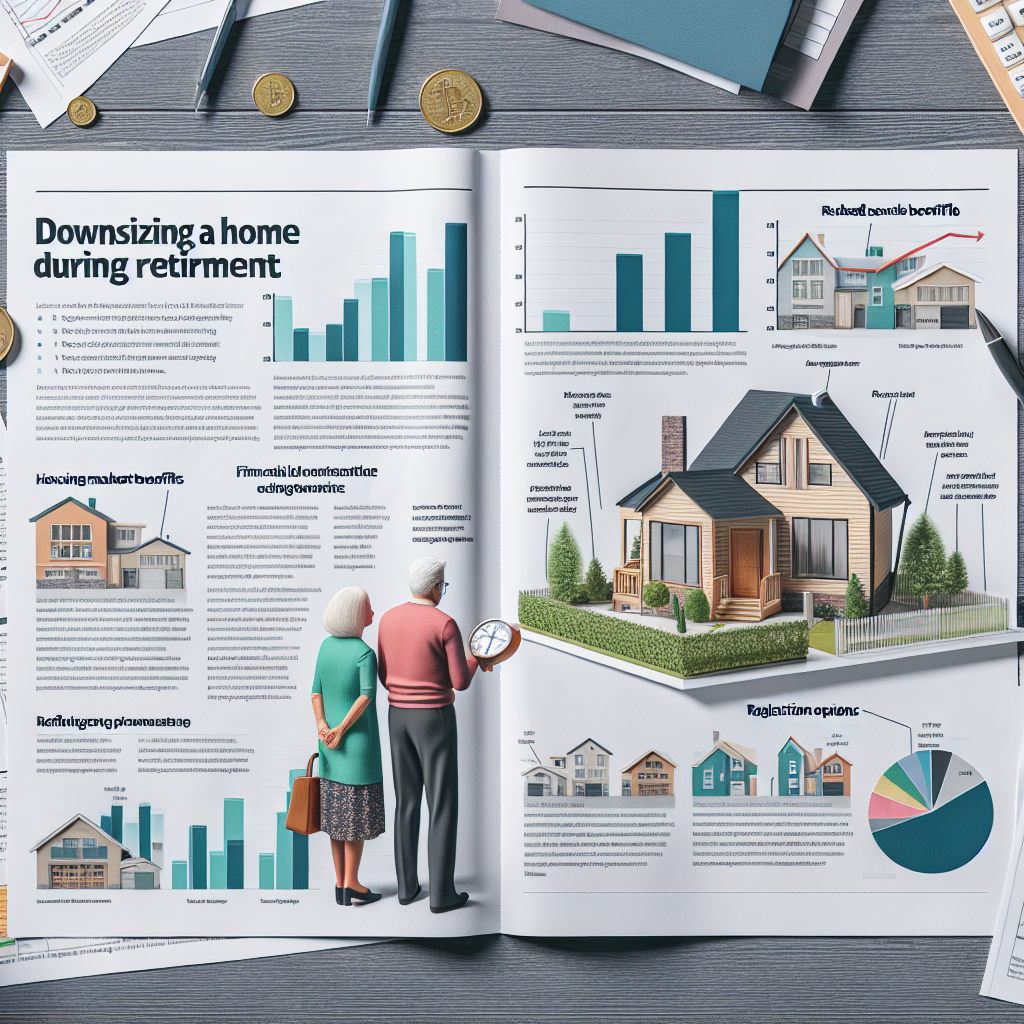If you’re approaching retirement, the idea of downsizing your home may have crossed your mind. But what impact would it have on your future finances? In this article, we’ll explore the various ways downsizing can affect your retirement and provide you with valuable insights to make an informed decision. From increased cash flow to reducing maintenance costs, we’ll help you understand the potential benefits and considerations of downsizing your home in retirement. So, whether you’re looking to simplify your lifestyle or boost your retirement savings, read on to discover how downsizing can shape your golden years.
Financial Implications
Reduced Housing Expenses
When downsizing your home, one of the significant financial benefits is the reduction in housing expenses. Whether you choose to purchase a smaller house or rent a more compact apartment, you can expect your monthly housing costs to decrease significantly. This reduction can help you free up funds that can be allocated towards other retirement goals, such as increasing your savings or paying off debts.
Lower Mortgage or Rent Payments
Downsizing often involves transitioning to a smaller property with a lower mortgage or rent payment. This can have a substantial impact on your monthly budget, allowing you to allocate those savings towards other financial objectives. With a smaller mortgage, you may even have the opportunity to pay off your home outright, reducing your financial obligations and providing you with a valuable asset in retirement.
Decreased Property Taxes
Another financial advantage of downsizing your home is the potential decrease in property taxes. As you move to a smaller property, your property tax assessment may also decrease, resulting in lower annual taxes. With fewer tax obligations, you can allocate those funds towards building your retirement savings or enjoying a more comfortable retirement lifestyle.
Potential to Eliminate Home Equity Loan
If you have an existing home equity loan, downsizing can provide an opportunity to eliminate this debt completely. By selling your current home and using the proceeds to pay off the loan, you can free up additional funds for your retirement savings or other financial goals. eliminating debts before retirement can provide you with greater financial freedom and peace of mind.
Impact on Retirement Savings
Increased Available Funds
By downsizing your home, you will have more funds available for your retirement savings. The money saved from a smaller mortgage or rent payment can be redirected towards your retirement accounts, allowing you to increase your contributions and accelerate the growth of your savings. The impact of compounding interest over time can be significant, giving you a more substantial nest egg to rely on during your retirement years.
Additional Contributions to Retirement Accounts
When you downsize, you not only save on housing expenses but also have the opportunity to make additional contributions to your retirement accounts. By redirecting the money you save from downsizing towards your retirement accounts, you can take advantage of tax-advantaged growth opportunities and maximize your savings potential. This can help you build a more secure financial future and provide for a comfortable retirement lifestyle.
Potential for Early Repayment of Debts
Downsizing your home can also allow you to pay off your debts earlier, providing you with greater financial security in retirement. With the extra funds available from downsizing, you can allocate a portion towards paying off high-interest debts, such as credit card balances or personal loans. By eliminating these financial obligations before retirement, you can reduce your monthly expenses and have more disposable income to enjoy in your golden years.

Healthcare and Insurance
Affordability of Medical Expenses
The affordability of medical expenses is one crucial consideration when downsizing your home. As you age, healthcare costs can become a significant financial burden. By downsizing to a smaller property with lower maintenance costs and potentially closer proximity to medical facilities, you can reduce some of these expenses. Additionally, with the extra funds saved from downsizing, you can allocate a portion towards healthcare savings or insurance premiums, allowing for better coverage and peace of mind.
Simplified and Lower Cost Insurance Coverage
When downsizing, you may find that your insurance coverage becomes more simplified and more affordable. With a smaller property, you may require less homeowners’ insurance, resulting in lower premiums. If you decide to rent, your insurance needs may shift towards renter’s insurance, which is typically less expensive. By reassessing your insurance policies after downsizing, you can ensure you have adequate coverage while also minimizing costs.
Adapting to Changing Healthcare Needs
Downsizing your home can provide an opportunity to adapt to changing healthcare needs as you age. Moving to a more accessible property, such as one-level living or a community with amenities tailored to seniors, can make it easier for you to navigate and maintain your independence as you grow older. By considering your long-term healthcare needs during the downsizing process, you can set yourself up for a smoother transition into retirement and greater peace of mind.
Lifestyle Considerations
Adjusting to a Smaller Space
One aspect to consider when downsizing is adjusting to a smaller living space. Moving from a larger home to a smaller property may require some lifestyle changes and decluttering. However, downsizing can also be an opportunity to simplify your life and focus on what truly brings you joy. By embracing a minimalist lifestyle, you can enjoy the benefits of reduced maintenance and utility costs, as well as a greater sense of tranquility in your living environment.
Access to Amenities and Services
Downsizing your home often means moving to a more communal living environment, such as a retirement community or a smaller neighborhood with amenities designed for retirees. These types of communities often offer a range of services and conveniences, including transportation, social activities, and access to healthcare facilities. Having these amenities readily available can enhance your retirement experience, allowing you to engage in activities you enjoy and make the most out of your golden years.
Opportunity for Travel and Hobbies
When you downsize your home, you may find yourself with more time and resources to pursue travel and hobbies. With fewer maintenance responsibilities and lower housing costs,
You can spend less time worrying about your property and more time enjoying the activities you love. Whether it’s exploring new destinations or indulging in long-cherished hobbies, downsizing can give you the freedom and flexibility to pursue your passions and create lasting memories in your retirement years.

Social Connections and Support
Maintaining Social Networks
Downsizing doesn’t necessarily mean leaving behind your existing social networks. If you choose to downsize within the same community or stay in close proximity to family and friends, you can maintain the important social connections that contribute to a fulfilling retirement. By staying engaged with your existing network, you can continue to nurture relationships and enjoy the support system that comes with them.
Close Proximity to Family and Friends
Downsizing can offer the opportunity to live in closer proximity to your loved ones. By choosing a smaller property that is located near family and friends, you can foster more frequent interactions and strengthen your relationships. This proximity can be especially valuable as you age, providing a sense of security and the ability to rely on loved ones for support and companionship.
Community Engagement and Activities
When you downsize your home, you often have the chance to become part of a new community. Retirement communities or neighborhoods designed for seniors often offer a range of social activities and opportunities for engagement. By participating in these activities and connecting with like-minded individuals, you can cultivate new relationships, expand your social circle, and find a sense of belonging in your retirement years.
Housing Market and Equity
Market Conditions and Sale Proceeds
One crucial factor to consider when downsizing is the current housing market conditions. Selling your current home and downsizing to a smaller property can provide you with valuable sale proceeds. However, fluctuations in the housing market can affect the amount you receive from the sale. It’s essential to carefully analyze the market and consult with real estate professionals to ensure an optimal outcome and maximize your financial gains.
Potential for Enhanced Retirement Funds
By downsizing your home, you can potentially enhance your retirement funds. The sale proceeds from your larger property can be redirected towards your retirement accounts or investments, providing an additional boost to your savings. This influx of funds can help you achieve your retirement goals and provide for a more comfortable lifestyle in your golden years.
Effect on Home Equity
Downsizing your home can have an impact on your home equity. If you have a significant amount of equity in your current property, selling and purchasing a smaller home or renting can potentially allow you to unlock that equity and utilize it for other financial purposes. By diversifying your assets and freeing up your home equity, you can create a more comprehensive retirement plan and potentially enjoy a higher quality of life during your retirement.

Estate Planning and Inheritance
Reducing Estate Complexity
Downsizing your home can simplify your estate planning process, making it easier for your loved ones to navigate your affairs after you’ve passed away. With a smaller property and potentially fewer assets, the process of distributing your estate and settling your affairs can be less complicated and time-consuming. By downsizing, you can proactively plan for the future and provide your family with a more streamlined inheritance process.
Planning for Future Generations
If leaving a legacy for future generations is important to you, downsizing your home can provide an opportunity to plan for this. By downsizing, you can potentially free up more funds to invest or designate for your heirs. Whether it’s setting up a trust or gifting assets during your lifetime, downsizing can help you create a financial strategy that supports the future needs and aspirations of your family.
Utilizing Home Equity for Legacy
Downsizing allows you to tap into the equity of your home and utilize it as part of your legacy planning. By downsizing to a smaller property, you can potentially use the proceeds from the sale of your larger home to invest, set up trusts, or make charitable donations. This can not only help you leave a lasting impact but also ensure that your financial resources are distributed according to your wishes.
Emotional and Psychological Impact
Adjustment to Change
Downsizing your home can have emotional implications, particularly if you have lived in your current property for a long time. Moving to a smaller space may require some adjustment, both physically and emotionally. It’s essential to prepare yourself for the change and focus on the positive aspects of downsizing, such as reduced maintenance, financial freedom, and the opportunity for a more fulfilling retirement lifestyle.
Attachment to Home and Memories
Leaving behind a home filled with memories can be challenging. Downsizing may bring about feelings of nostalgia and attachment to the familiar. However, it’s important to remember that memories are not confined to a physical space. Moving to a smaller property can create new memories and allow you to focus on the experiences and relationships that truly matter in your retirement years.
Positive Psychological Benefits
While downsizing can come with emotional challenges, it can also bring about positive psychological benefits. By simplifying your living space and reducing the stress associated with homeownership, you can create a more peaceful and harmonious environment. With fewer responsibilities and financial burdens, you may experience greater peace of mind, enabling you to fully enjoy your retirement and focus on the things that bring you happiness and fulfillment.

Tax Implications
Capital Gains Tax Exemptions
When downsizing, you may be eligible for certain capital gains tax exemptions. In some cases, if you meet specific criteria, you can exclude a portion of the profits from the sale of your home from capital gains tax. This can provide a significant financial advantage, allowing you to retain more of the proceeds from your home sale and allocate those funds towards your retirement savings or other financial goals.
Potential Reduction in Property Taxes
Downsizing your home can also potentially result in a reduction in property taxes. With a smaller property, your tax assessment may decrease, resulting in lower annual taxes. By saving on property taxes, you can free up additional funds that can be directed towards building your retirement savings or enhancing your lifestyle in retirement.
Impact on State and Local Taxes
In addition to potential reductions in property taxes, downsizing your home can also have an impact on your overall state and local tax obligations. Depending on the area you choose to downsize to, you may experience changes in income tax rates, sales tax rates, or other local taxes. It’s important to consider these factors when evaluating the financial implications of downsizing and consult with a financial advisor to understand the potential tax consequences.
Planning and Timing
Considering Retirement Goals and Objectives
When contemplating downsizing, it’s crucial to align your decision with your retirement goals and objectives. Take the time to evaluate what you want to achieve in retirement and how downsizing can help you attain those goals. Whether it’s increasing your savings, reducing your financial obligations, or enhancing your retirement lifestyle, understanding your priorities will guide your downsizing strategy and ensure a successful transition.
Weighing Financial Factors
Downsizing requires careful consideration of various financial factors. Take into account the costs associated with selling your current home, purchasing a smaller property, or renting. Evaluate how downsizing will impact your monthly budget, retirement savings, and other financial goals. By thoroughly assessing the financial implications, you can make an informed decision that aligns with your long-term financial well-being.
Consulting with Financial Advisors
Before embarking on the downsizing journey, it’s advisable to consult with financial advisors to ensure you’re making sound decisions. Financial professionals can provide guidance on the tax implications, investment strategies, estate planning, and overall financial impact of downsizing your home. Their expertise will help you navigate the complexities of the process, make informed choices, and set yourself up for a successful and fulfilling retirement.


